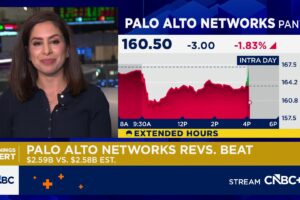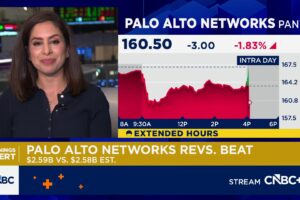
It won’t be your typical Easter, or Passover, on Wall Street, in the era of the deadly COVID-19 pandemic that has forced a global shutdown of businesses and caused governments to impose social-distancing measures to curb its spread.
But as i traditional, U.S. exchanges on Friday will be closed in observance of Good Friday, and those in Europe will also be closed for Easter Monday. The action on Wall Street is also likely to be more subdued with Passover starting Wednesday evening and ending the evening of April 16.
President Donald Trump had set Easter Sunday as a “beautiful” target date for the U.S. to get back to business, with “packed churches all over our country,” but that turned out to be an overly ambitious goal, even as the contagion has appeared to show glimmers of slowing, hinting at the possibility of somehow restarting the economy at some point.
Check out: ‘Reopen America’ by Easter? This staggering chart shows why that could be ‘an error of epic proportions’
The Securities Industry and Financial Markets Association, a brokerage-industry trade group that recommends actions for the bond market, advises that bond dealers close an hour early, at 2 p.m. Eastern on Thursday, and remain closed on Good Friday.
The New York Stock Exchange, owned by the Intercontinental Exchange ICE, -2.52%, and the Nasdaq Inc. NDAQ, -0.64% , which operates the Nasdaq Composite Index COMP, -0.32% , will be closed on Friday. The NYSE has been closed on the Friday before Easter every year since 1889, with two exceptions, in 1906 and 1907.
Read: Opinion: Clemson’s powerful football coach commits coronavirus fumble
The holiday is a quirky one for financial markets in the U.S. because Good Friday isn’t a federal holiday. In fact, it is among the few holidays that isn’t both a Wall Street and a federal holiday. Those include Columbus Day and Veterans Day, which are federal holidays but aren’t vacation days for Wall Street investors.
Therefore, data, such as the consumer-price index, a weighted-average measure of an array of consumer goods, will be released at 8:30 a.m. Eastern on Friday, even as traders have an off day.
Markets have struggled to find their footing as investors attempt to process the duration and economic severity of the coronavirus outbreak. CPI data likely won’t show immediate impacts of the pandemic, but other reports, including last Friday’s job figures that showed 701,000 lost jobs in March and last week’s record 6.6 million jobless claims numbers, have demonstrated stark signs of the devastation being wrought by COVID-19.
Still, markets have recently clung to data points that show a moderating spread in hot spots like New York and in Europe. That notion has offered support to the bulls, buoying the Dow Jones Industrial Average DJIA, -0.11%, the S&P 500 index SPX, -0.16% and the Nasdaq, even with Tuesday’s lackluster finish.
U.S. markets for commodities, including gold GCM20, -0.31% and crude-oil futures CL.1, +5.62% , will be closed on Good Friday.
Perhaps a trading break will be a welcome respite for whipsawed investors.
All Western European exchanges, including those in the FTSE 100 UKX, +2.18%, France’s CAC 40 PX1, +2.12% and Frankfurt DAX, +1.65%, are closed Good Friday and April 13, the Monday after Easter.
Elsewhere, the Toronto Stock Exchange will also be closed on Good Friday, as will exchanges in Hong Kong HSI, +2.12% , Singapore STI, -1.90% , Australia XJO, -1.25% , New Zealand NZ50GR, -0.32% and South Africa.
Exchanges in Japan NIK, -0.19%, South Korea 180721, -0.46% and Taiwan Y9999, +0.50%, however, will be open for trade on both days.
—Christopher Matthews contributed to this article









